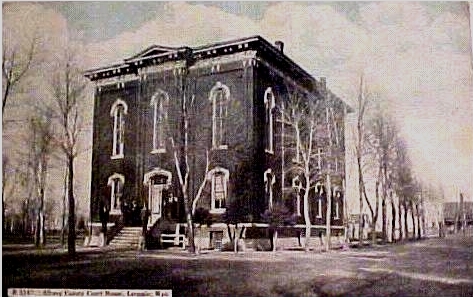
Albany County Courthouse, 1909
The Albany County Courthouse, constructed in the early 1870's, boasted a 1936 sq. ft.
courtroom with twenty foot high ceilings. In the basement were seven jail cells as well as two rooms for the jaior. The remainder
of the county government including the Sheriff was housed in five offices.
One business was started by local businessmen which survives to this day, a business created out
of the politics of the day. In 1878, the owners of the
Laramie Sentinel converted from a daily publication to a weekly. Thus, local lawyers Lorenzo D. Pease and Charles W. Bramel started
the Daily Times, which had decidedly Democratic leanings, much to the consternation of the
Republicans in the election of 1880. Accordingly, local Republicans including N. K. Boswell,
Stephen Downey, the Trabing Bros., Ora Haley, and others organized the
Laramie Daily Boomerang with Edgar Wilson "Bill" Nye (1850-1896), as editor and manager. Nye, at the
time, was a lawyer, justice of the peace, United States commissioner and newspaper correspondent for several
national papers.
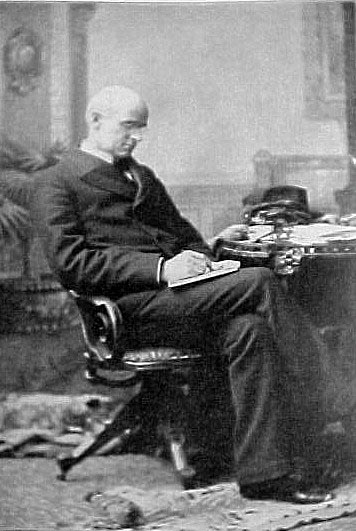
Bill Nye
Nye had previous to his arrival in Wyoming worked in a lawyer's office where he swept the floors, ran errands, and in his
spare time "read law." In those days, many lawyers, including as an example Abraham
Lincoln, never attended a college or law school, but would, instead, study law under the
tutelage of an older lawyer until they were ready to be admitted to the bar. In Wisconsin,
Nye was never admitted to the bar in Wisconsin, but instead worked as a teacher and sometimes newspaper
editor or writer. He later wrote:
* * * I went to Wyoming Territory, thinking that in the crude state of affairs there at
the time I might possibly be admitted to the bar under an assumed name. I had of course given
bonds in Wisconsin for my regular, annual examination for admission, but I decided
to jump my bail and go west, where the bar was less conservative.
On the day the train pulled into Cheyenne it was raining. In order to appear sucessful, Nye had purchased
for his travel an expensive-looking trunk covered with a material that looked like
leather. Unfortunately, in the rain the "leather" disintegrated revealing that all was sham, that the
trunk was covered with glued-on paper.
In many areas it was customary for older lawyers and judges to take young lawyers under their
wing. Thus it was in Laramie. There, Jacob Beeson Blair (1821-1901), an Associate Justice of the
Wyoming Territorial Supreme Court and a former
West Virginia Unionist Congressman, appointed a
panel of older lawyers to examine Nye for fitness to practice law. Rather than a formal multi-day
bar examination, the process of admission to the bar would be for such a panel to orally
examine the candidate for his knowledge of law and procedure and "move" for admission. By this
means Nye became a lawyer. In some federal courts, it is still necessary for an
applicant for admission find an older lawyer who will move in open court for the
admission of the younger lawyer and attest to the applicant's good moral character.
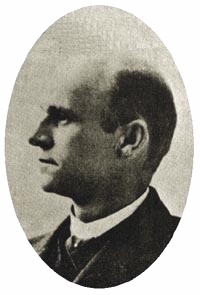 Bill Nye
The practice of law was not, howver, lucrative and Nye supplemented his
income as a justice-of-the-peace. Nye later recalled:
It was really pathetic to see the poor little miserable booth where I sat and waited
with numb fingers for business. But I did not see the pathos which clung to
every cobweb and darkened the rattling casement. Possibly I did not know
enough. I forgot to say this office was not a salaried one, but solely dependent upon
fees. So while I was called Judge Nye, and frequently mentioned in the papers with
consideration, I was out of coal half the time, and once could not
mail my letters for three weeks because I did not have the necessary postage.
But again, Judge Blair came to the rescue and introduced Nye to the publisher of the
Sentinel, Dr. James H. Hayford. "Doc" Hayford (1828-1902), in addition to being publisher of the
Sentinel, was postmaster, and a
physician and lawyer. Professor T. A. Larson quoted one of Hayford's competitors as saying:
"Doc Hayford can throw more mud with a teaspoon than I can with a scoopshovel." Larson, History of
Wyoming, p. 116.
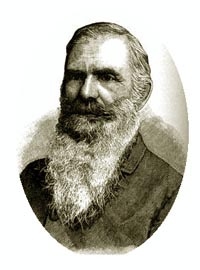
Jacob B. Blair
Nye wrote:
Dr. Hayford was a keen-eyed man with chin-whiskers, who wrote with a hard
pencil sharpened from time to time on a flat file. He wrote with such earnestness that one could
read his ablest editorials on any of the ten sheets of blank paper under the
ones he was writing on. He said said that the paper could not afford to pay me what I was really worth, very likely, but if $50
per month would make it interesting, he would be glad to have me try it
for thirty days. fifty dollars per month was so much better than the grazing at that
season of the year, that I accepted it; not too hurriedly, but after counting 100
in my mind, and giving the impression that I was not too prompt to avail myself
of the offer.
The Boomerang, named after Nye's mule, was located in three rooms on the second floor of the Kidd building over a shoe store. With a money crunch, the
paper moved to the upstairs over the livery stable on the corner of Garfield and
Third. W. E. Chaplin, a typesetter and later an owner of the rival Laramie Republican, described the move as:
perhaps the worst [mistake] during the time of his [Nye's]management. The fumes from the
stable came up through the floors and we all smelled too strong most of the time to go into
respectable society." Bill Nye in Laramie, Second Biennial Report, State Historian of Wyoming, 1922, p. 142
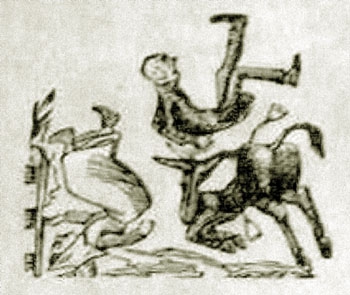 Boomerang, Illustration from Bill Nye and Boomerang, W. B. Conkey Co, Chicago, 1896.
Boomerang, Illustration from Bill Nye and Boomerang, W. B. Conkey Co, Chicago, 1896.
Nye, however, put a better spin on the move, indicated that the move to the
"parlor floor" of the stable was because the previous quarters were small.
Ultimately, Nye, taking no salary from the paper and always in need of
funds, accepted the position of
postmaster. In the winter of 1882-83, Nye became seriously ill and was removed by his
wife first to Greeley and then to Wisconsin for his health. In the sale of his stock,
Nye claimed that he was due more than $3,000. L. D. Pease, one of the founders of the
competing paper, was appointed by the Court to determine Nye's compensation. He ruled that Nye should be
paid $213.00. competition between rival newspapers was more than vying for the legal ads. It spilled over
into acerbic comments. One competitor describing Nye as "cadaverous in appearance." He was
like "last year's broomstick enclosed in gunny sacks." Nye continued writing for national papers and used the material in two books, one of which,
the 1881 Bill Nye and Boomerang; or The Tale of a meek-Eyed Mule and Some Other
Literary Gems, was dedicated to the mule:
To My Mule Boomerang,
Whose bright smile haunts me still, and whose low, mellow notes are
ever sounding in my ears to whom I owe all that I am as a great
man, and whose presence has inspired me ever and anon thoughout the
years that are gone
Having developed a
national reputation as a humorist and determined to go on the lecture circuit, he resigned his position as postmaster,
writing the President:
Postoffice Divan, Laramie City, W. T.,
October 1, 1883.
To the President of the United States:
Sir:
I beg leave at this time to officially tender my resignation as
postmaster at this place, and in due form to deliver the great seal and the
key to the front door of the office. The safe combination is set on the
numbers 33, 66 and 99, though I do not remember at this moment which comes
first, or how many times you revolve the knob, or which direction you should
turn it first in order to make it operate.
There is some mining stock in my private drawer in the safe, which
I have not yet removed. This stock you may have, if you desire it. It is a
luxury, but you may have it. I have decided to keep a horse instead of this
mining stock. The horse may not be so pretty, but it will cost less to keep him.
You will find the postal cards that have not been used under
the distributing table, and the coal down in the cellar. If
the stove draws too hard, close the damper in the pipe and shut the
general delivery window.
* * * *
Acting under the advice of Gen. Hatton, a year ago, I removed the
feather bed with which my predecessor, Deacon Hayford, had bolstered up his
administration by stuffing the window and substituted glass. Finding nothing in the
book of instructions to postmasters which made the feather bed a part of
my offical duties, I filed it away in an obscure place and burned it in effigy, also in the
gloaming. This act maddened my predecssor to such a degree that he
then and there became a candidate for justice of the peace on the
Democratic ticket. The Democratic party was able, however with what aid it
secured from the Republicans, to plow the old man under to a great degree.
* * * *
You will find the key under the door-mat and you had better
turn the cat out at night when you close the office. If she does not
go readily, you can make it clearer to her mind by throwing the cancelling
stamp at her.
If Deacon Hayford does not pay up his box rent, you might as
well put his mail in the general delivery, and when Bob Head gets drunk and
insists on a letter from one of his wives every day in the week, you can
salute him through the box delivery with an old Queen Anne tomahawk; which you
will find near the Etruscan water pail. This will not in any manner surprise
either of these parties.
* * * *
Mr. President, as an official of this Government I now retire. My
term of office would not expire until 1886. I must, therefore, beg pardon for
my eccentricity in resigning. It will be best, perhaps, to keep the
heart-breaking news from the ears of European powers until the dangers of
a financial panic are fully past. Then hurl it broadcast with a sickening thud.
[Writer's notes: Frank Hatton at the time was First Assistant Postmaster General and a humorist of note. He
was later appointed Postmaster General.
Bob Head was City Editor of the Boomerang and was fired by Nye for
alcoholism. In July, 1890, Head had found a job at the Ogden Democrat. On the
way to Ogden for his new job, he was drinking heavily, fell off the
train at Salt Wells near Rock Springs and was killed.]
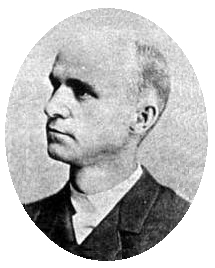 Bill Nye
There were, of course other reasons for establishing newspapers than the politics. There was strong rivalry
for both job printing and for legal advertising. The later, however, was dependent upon who was in
control at the Courthouse which in the 80's and 90's was hotly contested. The legal advertising issue
can be illustrated in a battle fought in the courts between the Laramie Weekly Republican and the
Board of County Commissioners. The County Treasurer placed the legal notices relating to the
sale of lands for taxes in the Republican. Unfortunately, several weeks before the Board of
County Commissioners had designated the Boomerang as the "official paper" of Albany County.
After the tax sales notices had run for four weeks as required by law, the Board refused to pay for the ads
on the basis that they should have been run in the Boomerang. The
courts went through County Attorney charles W. Bramel's arguments like the proverbial wet paper bag, with the
Supreme Court noting:
"An official paper of a county is a thing unknown to the common law. Our
statutes do not define it, or prescribe what use shall be made of it; and this is
legislative, and not a judicial, function. What use, if any, the
legislature intended should be made of the official paper of a county,
is a profound secret."
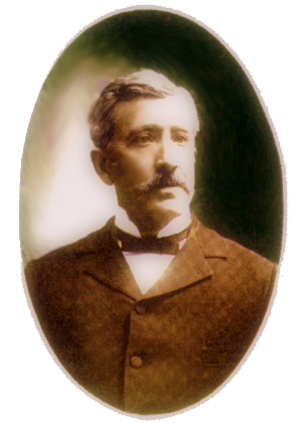 Judge Charles W. Bramel Judge Charles W. Bramel
Bramel was well placed with the Democratic Party and was appointed by Governor Osborn as judge advocate. He was
later elected as District Judge. While serving as district judge he heard a case involving a William Lepper in which
Lepper was sued for foreclosure of his land located near the Johnson Hotel. Lepper had been in the Laramie area for
since the 1870's and had been rumored to have been quite wealthy and had moved to California. Unfortunately, he began trading on margin on the
Chicago Board of Trade. Trading on margin brought him to financial ruin. In order to finance the margins he mortgaged his property in
Laramie. When the morgage holder sued to foreclose,
Lepper defended on the basis that trading on margin constituted "gambling. "Therefore, the mortgage and debt given to finance the trades were illegal and
unenforceable. Judge Bramel ruled in Lepper's favor. The mortgage holder appealed. While the appeal was pending,
Bramel left the bench and was replaced by Judge Carpenter. Lepper lost the appeal and the case when back to the District
Court for a determination of how much Lepper owed. there Lepper again lost and lost his property. Bramel advised Lepper that
an appeal was not warranted. With different lawyers, Lepper again appealed to the
Supreme Court where he again lost. See, Conradt v. Lepper, 13 Wyo. 475, 81 Pac 307, 82 Pac 2 and subsequent appeal
89 Pac. 575.
After the ruling came out, Lepper returned to Laramie from California. On October 24, 1907, Lepper entered Bramel's office upstairs over
Kleeman's Candy Store at 214 2nd Street. The office was a typical turn of the century law-office reached by a stairway
opening to the street and consisted of three rooms, a sparcely furnished reception, Judge
Bremel's office and a sleeping room. In his office, the aging jurist was
dozing in his chair. Lepper fired three shots directly into Bramel's face. After attemting to shoot a passerby below attacted by the sound of the
gun fire, Lepper went into a vacant office and saved the State the cost of another trial. Lepper's brother and daughter declined to
claim the body and Lepper was buried at county expense. Judge Bramel lingered for several days, and then the
Boomerang reported:
Although the wounded man has made a most valiant fight against he Grim Reaper, it has proved of no
avail for his constitution, impared by age and dissipation, could withstand the shock which is now the beginning of the end of one of the
west's most noted and a one time brilliant man. Semi-Weekly Boomerang, Oct 28, 1907.
Laramie Photos continued on next page.
|